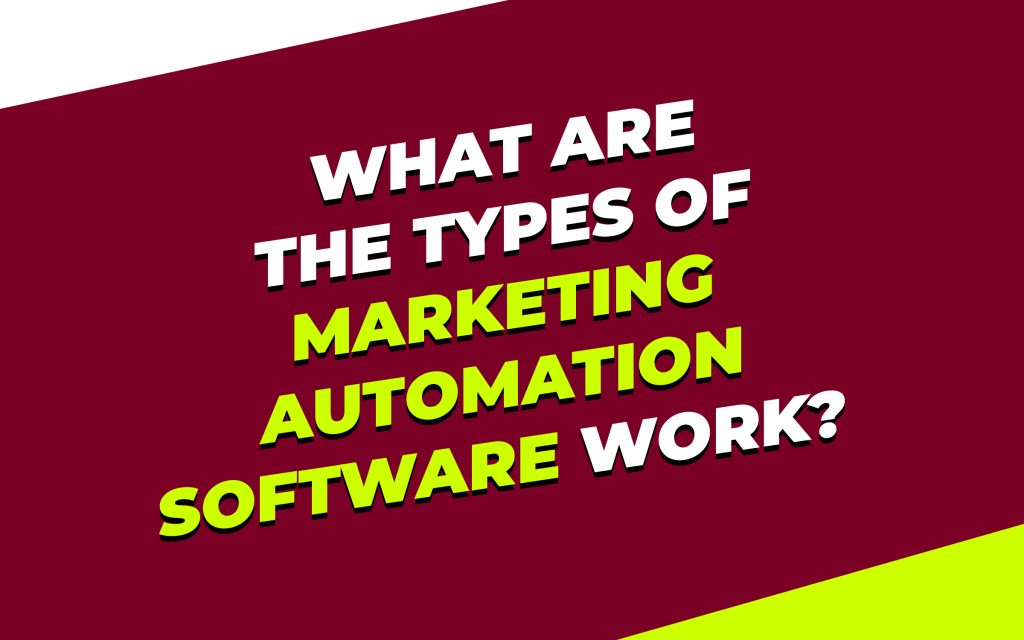In today’s digital age, businesses are constantly seeking ways to streamline their marketing efforts, enhance productivity, and boost revenue. Marketing automation software has emerged as a game-changer in achieving these goals. This article will delve into the different types of marketing automation software and how they work, shedding light on this powerful tool that has revolutionized the marketing landscape.
What is Marketing Automation Software?
Marketing automation software is a versatile platform designed to automate repetitive marketing tasks, manage multifaceted campaigns, and personalize customer interactions. It leverages technology, data, and AI-driven insights to deliver more efficient and effective marketing strategies. Let’s explore how it works and the various types available.
Types of Marketing Automation Software:
1. Email Marketing Automation:
Email marketing automation software streamlines email campaigns by segmenting audiences, scheduling emails, and delivering personalized content. It also tracks recipient engagement, such as open rates and click-through rates, providing valuable data for future optimizations.
2. Social Media Marketing Automation:
Social media marketing automation tools assist in scheduling posts, curating content, and analyzing performance metrics across multiple social platforms. They help maintain a consistent online presence and engage with the target audience.
3. Customer Relationship Management (CRM) Automation:
CRM automation software manages customer data, interactions, and communication. It automates lead nurturing, tracks customer interactions, and assists in creating personalized marketing campaigns based on customer behaviors and preferences.
4. Content Marketing Automation:
Content marketing automation tools aid in content creation, distribution, and management. They help marketers streamline the content lifecycle, from ideation to publication, and ensure content aligns with the overall marketing strategy.
5. Analytics and Reporting Automation:
Analytics and reporting tools gather data from various marketing channels, providing insights into campaign performance. They generate reports and visualizations that enable data-driven decision-making.
6. Marketing Sales Funnel Automation:
These tools focus on lead generation, nurturing, and conversion. They automate tasks like lead scoring, email follow-ups, and sales pipeline management, enabling smoother transitions from marketing to sales.
7. E-commerce Marketing Automation:
E-commerce automation software optimizes online stores by automating processes like cart abandonment emails, product recommendations, and personalized shopping experiences, ultimately boosting sales.
How Marketing Automation Software Works:
Marketing automation software operates by:
Data Collection:
It gathers data from various sources, such as websites, emails, and social media, creating a comprehensive customer profile.
Segmentation:
It divides the audience into segments based on demographics, behavior, and engagement levels.
Personalization:
It tailors marketing content and messages to individual segments, increasing relevance and engagement.
Automation:
It automates marketing tasks like sending emails, posting on social media, and lead scoring, saving time and ensuring consistency.
Analysis:
It tracks and analyzes campaign performance, enabling marketers to make data-driven decisions and refine strategies.
Integration:
It seamlessly integrates with other marketing tools, CRMs, and analytics platforms to create a cohesive marketing ecosystem.
Conclusion:
Marketing automation software has revolutionized the way businesses approach marketing. It offers a diverse range of tools and functionalities, including email marketing automation, social media management, CRM automation, content marketing, analytics, sales funnel management, and e-commerce optimization. By leveraging data and AI-driven insights, marketing automation software empowers marketers to create more targeted, personalized, and efficient marketing campaigns, ultimately driving growth and success.
In today’s competitive landscape, embracing marketing automation is not just an option but a necessity for businesses looking to thrive in the digital realm. So, whether you are a small startup or a multinational corporation, consider integrating the right marketing automation software into your strategy to unlock its full potential.

